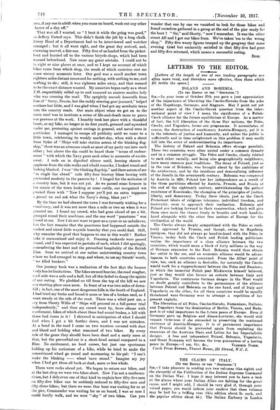LETTERS TO THE EDITOR.
[Letters of the length of one of our leading paragraphs are often more rend, and therefore more effective, than those which fill treble the space.]
POLAND AND BOHEMIA.
[To THE EDITOR OF THE "EPTMITOR.") Sit,—In your issue of October 27th you gave a just appreciation of the importance of liberating the Czecho-Slovaks from the yoke of the Hapsburgs, Germans, and Magyars. May I point out yet another aspect of the Ceecho-Slovak question from the inter- national point of view P I mean the significance of a Polish- Czech alliance for the future equilibrium of Europe. As a matter of fact, the full liberation of the three Slav nations, the Poles, Czechs, and Yugoslays, forma one programme. It necessitates, of course, the destruction of reactionary Austria-Hungary, yet it is in the interests of justice and humanity, and unless the public is sufficiently and in time enlightened on this problem it may easily fall into the error of underestimating its importance.
The history of Poland and Bohemia offers strange parallels. These two countries were often united under a common dynasty and in a common struggle. The Poles and Czechs, closely related to each other racially, and being also geographically neighbours, have many common past traditions. The decay of Poland, just as in the case of Bohemia, was brought about by the ambitions of the aristocracy, and by the insidious and demoralizing influence of the Jesuits in the seventeenth century. Bohemia was conquer v[ by Austria in 1620; Poland lost her independence as a result of the three partitions effected by Austria, Prussia, and Russia at the end of the eighteenth century, notwithstanding the gallant resistance of Kosciuszko, the champion of the principles of justice, liberty, and democracy. To-day these ideals, just as the Czech Protestant ideals- of religious tolerance, individual freedom, and fraternity, seem to approach their realisation. Bohemia and Poland are looking forward to their resurrection, which will give them once more the chance freely to breathe and work hand-in- band alongside with the other free nations of Europe for the civilisation of the world.
The -Czechs always deeply sympathized with the Poles so ruth- lessly oppressed by Prussia, and though, owing to Hapsburg intrigues, they did not always go band-in-band with the Poles in Vienna, to-day both the Czech and Polish leading politicians realise the importance of a close alliance between the two countries, which would mean a block of forty millions in the way of German expansion to the East. Bohemia would thus obtain her outlet to the sea, and an economic alliance would be advan- tageous to both countries concerned. From the Allies' point of view, too, such an alliance is desirable, for naturally the Czechs would work for a rapprochement between the Poles and Russians, in which the immortal Polish poet Mickiewics himself believed, just as they would also favour an entente between Italy and Yugoslavia. The continuous German danger in the West would no doubt greatly contribute to the permanence of the alliance between Poland and Bohemia on the one hand, and of Italy and Yugoslavia on the other, for all these countries would be equally threatened were Germany ever to attempt a repetition of her present exploits.
The liberation of all Poles, Czecho-Slovaks, Rumanians, Italians, and Yugoslays from the domination of Berlin, Vienna, and Buda- pest is of vital importance to the future peace of Europe. Even if Germany gave up Belgium and Alsace-Lorraine, she would still remain victorious if she succeeded in preserving the continued existence of Austria-Hungary. It is of paramount importance that Prussia should be prevented again from exploiting the resources of the Austrian Slays and Latins for her Imperialistic designs. A free and independent Poland, Bohemia, Yugoslavia, and Great Rumania will become the true guarenteee of a lasting


































 Previous page
Previous page